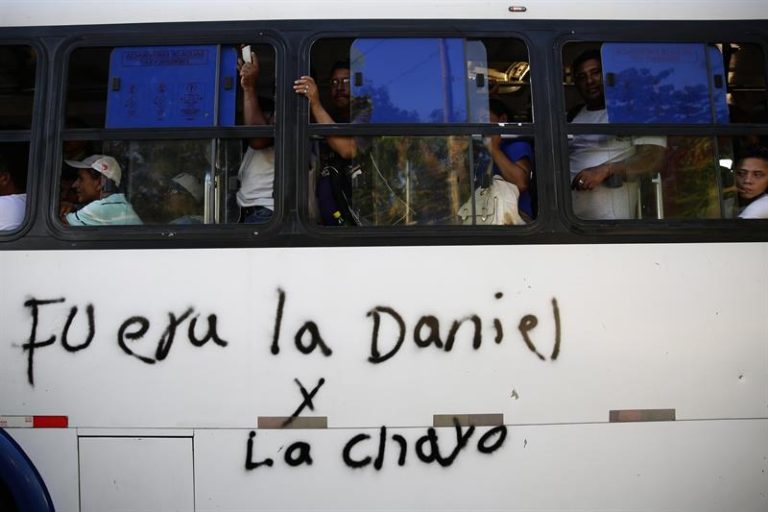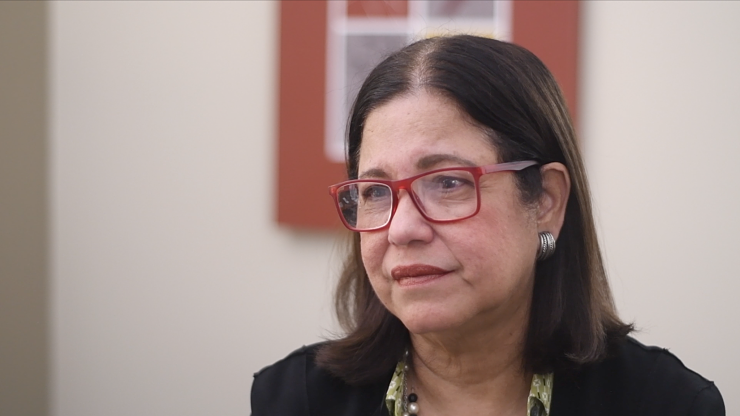9 de agosto 2019

Children of Exile: The Births “Sowing Hope” in the Camp of Nicaraguan Farmers

PUBLICIDAD 1M
PUBLICIDAD 4D
PUBLICIDAD 5D
“Strengthen the dialogue between the National Unity and the Civic Alliance” recommends Granera, who urges international organizations to assist.

Graffiti and against Daniel Ortega y Rosario Murillo on a public bus in Managua. Photo: Bienvenido Velasco / EFE / Confidencial
Violeta Granera, member of the political council of the Blue and White National Unity movment, claims to be conscious of the desperation and criticism of Nicaraguans inside and outside of the country, in regards to the current context of the social political crisis, when Daniel Ortega has put an end to the national dialogue and closed the doors on early elections.
Faced with this panorama, Granera claims that the National Unity along with the Civic Alliance are reassessing the organization and path to follow considering these questions: “What are we going to do faced with Ortega’s clear intention of going the unilateral route? What are we going to do faced with an electoral process? What are we going to do to improve territorial organization? How do we relaunch citizen mobilization?”
Granera reveals in this interview with Esta Semana and CONFIDENCIAL that they’re working as hard as they can on this. Besides, facing questioning from some sectors, she calls for “active patience”, a concept that she explains in this interview in San Jose, Costa Rica, where several members of the Civic Alliance and the National Unity met this week to analyze the political strategies of the Blue and White movement.
How do you evaluate the current context of the social political crisis and the civic struggle, during a moment when desperation among citizens is perceived?
Two things must be very clear. One, that the people have opted for the civic route to fight the battle against the dictatorship, which is an enormous leap in quality because it opens up possibilities to break the cycle of violence that has been recurrent in Nicaragua. But there’s also the other side, and it’s that civic struggles are not as fast as we would like them to be. They’re about resistance and wearing down. So here what we have to do is strengthen citizen organization, civic resistance, try to resist and wear down the regime.
I’m positive in spite of the anguish and pressure that everyone is feeling. I share the desire that this be quicker than it has been, but the truth is that we need to have active patience. Active patience means that we don’t get desperate, but neither do we sit and wait for others to come and do what we have to do. I think the people of Nicaragua have that attitude and they have shown it for more than a year. There’s no sign that this resistance is not alive. What we haven’t been able to do is recover the streets, however the time is coming because the regime is wearing down.
There are some voices that criticize the National Unity, above all the Civic Alliance, stating that they are not inclusive when it comes to decision making…or in other cases stating that they don’t represent them
I would answer in two aspects. In the first place, on the issue of representation at the negotiation table, if there ever is one again, the Blue and White National Unity has told the Alliance about the citizens’ viewpoint that there should be greater representation of other sectors. However, at this point what’s important is to strengthen the dialogue between the National Unity and the Civic Alliance. Why? Because the National Unity is the space with the greatest representation of the social and political movements, territorial organizations and the Civic Alliance is part of the Blue and White National Unity. We are on that path.
We have formed a commission which we call ‘7×7”. We are seven from one sector and seven from another and we are looking to improve joint decision making on strategic issues. For example, what are we going to do faced with Ortega’s clear intention of following a unilateral route? What are we going to do faced with an electoral process? What are we going to do to improve territorial organization? How do we relaunch citizen mobilization? These are the main issues and is where we can find the big national agreements.
You have come to Costa Rica to have a series of meetings with the Alliance, but also with those in exile. What is this process about? Have you been able to do this in Nicaragua?
We all came to Costa Rica because we know there’s an important amount of people exiled here. More than 70,000 Nicaraguans are in conditions, which I must say, truly tragic. There’s an accumulation of pain, a lot of hopelessness, anguish and a great desire that the situation of Nicaragua is resolved so they can return to their country. It’s important to maintain that dialogue.
It’s not the first time the Alliance and the National Unity has the possibility of these encounters, but they must continue in a sustained manner. I believe one of the most important results that I see appearing is the urgency to convene international organizations working on humanitarian and migration issues, to reach agreements on how to assist Nicaraguans during this stretch of time left before a safe return. People are going through many difficulties and it’s a situation that is not in our hands to solve, however it is to continue making efforts so the international community can help us relieve the exiled peoples’ situation.

Violeta Granera, member of the Political Council of the Blue and White National Unity. // Foto: Elmer Rivas
Let’s talk a little about Daniel Ortega’s posture and what he said on July 19th. He proposed a unilateral electoral reform…
We don’t accept unilateral reforms from Ortega. We are committed to finding a solution to what this dictatorship has provoked. It’s through a civic and electoral route but not accepting just any election. In the National Unity we are convinced that at this moment we cannot accept mediocre measures for two reasons. One is of an ethical and political type, which is the commitment with the people that rose up in April, who have maintained the rebellion, have exposed their lives, more than 300 Nicaraguan died, who have put up with imprisonment, kidnappings, torture and who are in exile. This is the most important reason to maintain the route for true change, not a figment of change, not a mockery, no repeat of the electoral farce of the past.
And the other reason is strictly political: we cannot risk that what Nicaragua has experienced gets repeated a couple of years later. The people have fought for deep change and at least the National Unity and all of its organizations including the Civic Alliance, have to be very consistent and coherent with this commitment.
What kind of electoral reforms does the Blue and White Alliance propose?
There are several points that are key, but there are two important ones. One is to guarantee respect for the popular vote. And that has to do with several reforms: changes in the Supreme Electoral Council and in the whole structure to establish mechanisms that guarantee the counting be transparent. And of course, national and international electoral observation. Another big area would be the issue of candidacies. For people to be able to really chose in accord with their expectations. That’s to say there needs to be a possibility for alliances. In the National Unity we are thinking of forming a big coalition and continue strengthening this space in which citizens have participated around a program for deep change for the future of Nicaragua.
Can that be done if Ortega has already closed the doors on early elections? Is there a way out of the crisis without early elections?
No. We have said that Nicaragua cannot wait to 2021, simply because there is no way the country can maintain itself until then. For several reasons, because the people are not going to stand more repression like what we are experiencing. To prolong the exit of the human rights crisis also carries other scenarios which we have been wanting to avoid but is precisely where Daniel Ortega wants to take us. Also, for economic reasons. Projections for next year are disastrous. We already have 300,000 unemployed and if things continue like this, we could reach a situation of humanitarian crisis like the one in Venezuela. We cannot allow that.
Why do you think Daniel Ortega rejects the dialogue in this moment of the crisis?
Ortega’s intention is to stay in power no matter what. And of course, he will have to make some concessions. What he’s thinking of doing at this moment is to make superficial electoral reforms with puppet parties that we know have not been firm in the struggle against the dictatorship. He wants to give these reforms legitimacy with this model.
We are working with the OAS’s commitment, especially Luis Almagro’s, of not collaborating with reforms that are not made within the framework of a dialogue with the Civic Alliance. Why? Because the political parties can send in their proposals, but the negotiation has to be in a space where there is no conflict of interests, as there is within the traditional parties. Why do I say this? Logically with some of those parties there’s a pact established under [the umbrella of] a bipartisan system [Ortega’s FSLN and Aleman’s Liberal Constitutionalist Party] and that is the origin of the problems experienced during the past electoral farce and which have us in this crisis.
Will the Civic Alliance and the Blue and White Unity be well prepared for possible early elections? Are they talking about this?
Yes, we are talking about it because it’s the way out we all would want. However, we also have issues that are priority such as the liberation of all the political prisoners. There are now more than the eighty pending. Another priority is the compliance with the second agreement in regard to the respect of civil liberties. It’s central because we cannot speak about electoral process without the element of citizen security.
We cannot imagine how we are going to have competitive elections, no matter how many reforms are made to the Electoral Law if our brothers and sisters, like for example now in the rural areas, are under bloody repression. How are they going to organize and propose candidates if the dictator and his goons decide they and their horses turn up dead the next day. The issue of security is essential to the issue of electoral reforms.
Archivado como:
PUBLICIDAD 3M
Periodista. Destaca en cobertura a violaciones de derechos humanos: desplazamiento forzado, tráfico ilegal en territorios indígenas, medio ambiente, conflictos mineros y ejecuciones extrajudiciales. Premio Iberoamericano Rey de España 2018.
PUBLICIDAD 3D